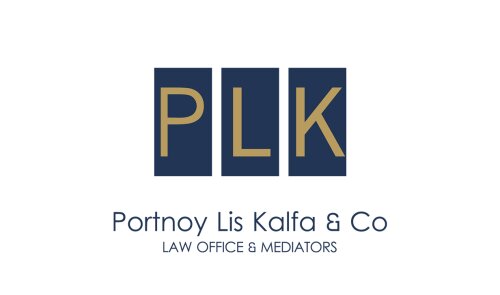Best Drunk Driving Lawyers in Ashdod
Share your needs with us, get contacted by law firms.
Free. Takes 2 min.
List of the best lawyers in Ashdod, Israel
About Drunk Driving Law in Ashdod, Israel
Drunk driving is considered a serious offense throughout Israel, including in the city of Ashdod. The law strictly prohibits operating a motor vehicle while under the influence of alcohol, with specific legal limits set for the amount of alcohol in a driver’s bloodstream. The authorities actively enforce these laws to ensure road safety for all residents and visitors. Being found guilty of drunk driving in Ashdod can lead to severe penalties, including fines, license suspension, and even imprisonment.
Why You May Need a Lawyer
If you have been accused of or charged with drunk driving in Ashdod, it is crucial to seek legal advice. Here are some common scenarios where legal help may be necessary:
- You believe you were falsely accused or the breathalyzer test was inaccurate. - You have failed a roadside sobriety test or breathalyzer. - You are facing your first offense and are uncertain about your rights. - You are a repeat offender facing harsher penalties. - Your driver’s license has been suspended, affecting your livelihood. - There was an accident or injury associated with your case. - You need help negotiating a plea deal or reduced sentence. - You want to appeal a conviction or administrative penalty.
A lawyer skilled in drunk driving cases can help protect your rights, evaluate case evidence, represent you in court, and work towards achieving the best possible outcome for your situation.
Local Laws Overview
Israeli law defines drunk driving as operating a vehicle when blood alcohol concentration (BAC) surpasses legal limits. For most drivers, the limit is 50 milligrams of alcohol per 100 milliliters of blood or 240 micrograms of alcohol per liter of breath. For drivers under the age of 24, new drivers, bus drivers, and professional drivers, the limit is much lower - typically just 10 milligrams per 100 milliliters of blood.
Police in Ashdod may stop drivers for random checks. If you are suspected of being under the influence, officers can administer a breathalyzer or, in some cases, order a blood test. Refusing to take these tests is itself a criminal offense and can result in immediate license suspension or other penalties.
Penalties for drunk driving can include hefty fines, mandatory license disqualification, community service, and possibly imprisonment. The severity of punishment often depends on factors such as previous offenses, how far the BAC exceeded legal limits, and whether an accident or injury was involved.
Frequently Asked Questions
What is considered legal intoxication for drivers in Ashdod?
For most drivers, a blood alcohol concentration (BAC) above 50 milligrams per 100 milliliters of blood is considered over the limit. For new, young, and professional drivers, the threshold is only 10 milligrams.
What happens if I refuse a breathalyzer or blood test?
Refusing a test is a criminal offense in Israel. It can result in automatic license suspension, and the refusal may be used as evidence against you in court.
What penalties can I face for a first-time drunk driving offense?
First-time offenders usually face a fine and a minimum two-year license suspension. The court may also impose community service or, in severe cases, jail time.
Can my car insurance be affected by a drunk driving conviction?
Yes. Most insurance companies will increase your premiums and may even refuse to renew your policy if you have a drunk driving conviction.
What should I do if stopped by police for suspected drunk driving?
Remain calm and cooperative, provide identification, and comply with lawful requests for a breath or blood test. Avoid making statements that may incriminate you.
Do I have the right to speak to a lawyer before taking a breath or blood test?
You must comply with the police request for a breath or blood test immediately, but you can and should seek legal representation after the process, especially if you are arrested or charged.
Will a conviction affect my ability to travel abroad?
A drunk driving conviction is a criminal offense and may impact your ability to travel to certain countries, depending on visa and entry policies.
Are there any defenses to a drunk driving charge?
Yes. Common defenses include challenging the accuracy of the test, the procedure followed by the police, or providing a valid medical explanation for a false positive. A lawyer can best advise you based on your circumstances.
Can I reduce or avoid a license suspension?
In some cases, a lawyer may help you negotiate reduced penalties or alternative measures, such as a conditional license for essential travel, but this depends on the facts of your case.
How long will a drunk driving conviction remain on my record?
A drunk driving conviction will usually remain on your criminal record for several years following completion of your penalties. The length of time may impact future employment and insurance.
Additional Resources
If you are seeking help or more information about drunk driving in Ashdod or anywhere in Israel, the following organizations and governmental bodies can provide support or guidance:
- Israel Police (Mishtara): Handles traffic enforcement and investigation. - Ministry of Transport and Road Safety: Governs license suspensions and driver education. - Legal Aid Bureau (Saar Mishpati): Offers free or reduced-cost legal advice for those who qualify. - Local Bar Association: Provides listings of qualified attorneys in Ashdod who specialize in traffic and criminal law. - National Road Safety Authority: Delivers educational materials and updates on traffic law.
Next Steps
If you have been charged with or are under investigation for drunk driving in Ashdod, it is important to act quickly. Consider the following steps:
- Document all details about the incident, including time, place, and conditions. - Do not discuss your case with anyone except your lawyer. - Seek legal advice from an attorney specializing in traffic or criminal law as soon as possible. - Attend all court dates and comply with any temporary orders or suspensions. - Use the resources of local organizations or government offices for guidance while your case is ongoing.
Taking timely and informed legal action will give you the best chance of minimizing consequences and protecting your future.
Lawzana helps you find the best lawyers and law firms in Ashdod through a curated and pre-screened list of qualified legal professionals. Our platform offers rankings and detailed profiles of attorneys and law firms, allowing you to compare based on practice areas, including Drunk Driving, experience, and client feedback.
Each profile includes a description of the firm's areas of practice, client reviews, team members and partners, year of establishment, spoken languages, office locations, contact information, social media presence, and any published articles or resources. Most firms on our platform speak English and are experienced in both local and international legal matters.
Get a quote from top-rated law firms in Ashdod, Israel — quickly, securely, and without unnecessary hassle.
Disclaimer:
The information provided on this page is for general informational purposes only and does not constitute legal advice. While we strive to ensure the accuracy and relevance of the content, legal information may change over time, and interpretations of the law can vary. You should always consult with a qualified legal professional for advice specific to your situation.
We disclaim all liability for actions taken or not taken based on the content of this page. If you believe any information is incorrect or outdated, please contact us, and we will review and update it where appropriate.









